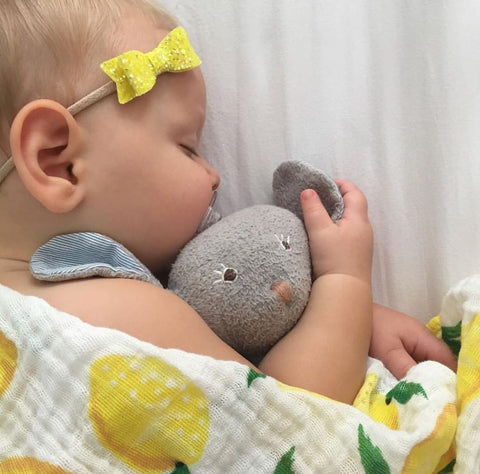THE BENEFITS OF ORGANIC TOYS
 (Photo by Kaye Misicka @graceandmeadows)
(Photo by Kaye Misicka @graceandmeadows)
Many parents who regularly buy and cook organic food for their children are less diligent when it comes to buying organic toys. One reason is that toys are not eaten, so the concern seems less obvious to parents. Another is the relative scarcity of organic toys—unlike organic food, which is now sold in every supermarket as well as specialty stores.
But as the benefits of organic toys are becoming better understood, many conscientious toy makers are responding to the demand. Organic toys have many benefits but most can be divided into two categories: personal health and environmental health.
Into the Mouths of Babes
Although children don’t eat toys, every parent knows that babies and toddlers certainly do put toys, and anything else they can hold, into their mouths. “Tasting” objects is one way that babies learn about the world around them—and discover what is edible and what isn’t. Moreover, some toys, like teething rings, are designed specifically to be put in the mouth.
Unfortunately, many conventional toys are manufactured from toxic materials and chemicals that don’t belong in a baby’s mouth. Some of the worst offenders, such as lead, are banned in the United States and many other countries. But the vast majority of the cheapest and most popular mass-produced toys sold in the West are made in Asian countries where regulation is lax.
For example, lead continues to be found in paint that is used on toys. Lead is inexpensive and makes very durable paint, so it is difficult to get unregulated Asian manufacturers to abandon its use. Lead is a neurotoxin that is particularly dangerous to young, developing brains. There is no safe level of lead that humans can consume, and lead-paint toy recalls by the Consumer Products Safety Commission (CPSC) are common.
Plastic toys can also be laced with dangerous fire-retardant chemicals, as well as various forms of polybrominated diethyl ethers (PBDEs), many of which are banned in Canada, Europe and several U.S. states.
Many mass-produced dolls and other soft toys are made of PVC vinyl, which is identified by recycling label number 3 on many household items. This type of plastic is a known hormone disrupter and possibly cancerous.
Finally, many mass-produced conventional crayons continue to test positive for trace amounts of asbestos, a cancer-causing mineral. Asbestos particles must be inhaled to be dangerous; the CPSC believes the risk of airborne asbestos from crayons is insignificant, but with organic crayons and other craft materials readily available, there is no need to take a chance.
By contrast, organic toys are made out of materials like wood, wool and paper that are closer to nature than plastic and other petroleum-based products. By choosing organic toys for your child, you won’t have to wonder which dangerous manmade chemical is lurking beneath the surface.
A Rash of Problems
Ingesting toxins through toys that end up in little mouths is just one personal health problem. The chemicals in conventional toys can also cause or exacerbate a number of skin ailments, from dermatitis to eczema. Here the culprits are often mass-produced fabrics that have been processed, treated or dyed with resins and chemicals like formaldehyde.
Take cotton, the production of which accounts for 25 percent of the pesticides used worldwide. In order to remove seeds and oils from mechanically-harvested raw cotton, manufacturers use harsh chemicals that can linger in the fabric.
By contrast, organic cotton is harvested by hand and then washed in hot water and gentle soap; there are no acidic residues or pesticides.
Eco-Friendly Play
Beyond personal health concerns, organic toys offer a number of environmental benefits—most of which are directly related to the personal issues outlined above. Plastic toys begin with petroleum, and while toys aren’t “burned” like fuel, the production of plastic from crude oil contributes to global warming.
Moreover, using the world’s limited petroleum reserves for toys means there will eventually be less available for useful medicines and other beneficial products that are made of plastic. The pesticides used to make conventional fabrics and paper in toys are also poisoning our water and air—particularly in rural areas and under-developed countries.
Unsustainable harvesting practices are decimating cropland all over the world. Toys made from organic and sustainably grown and harvested products leave less of an imprint on the earth. No pesticides means healthier farm families, all over the world. And because most organic toys are handmade, they create employment for the very people who are losing their livelihoods as the planet heats up and waters rise.
A side benefit of organic toys is that they are usually simpler than mass-produced conventional toys, and encourage children to develop their imagination through creative play.
For example, dolls made of organic wool and cotton don’t have the “baked-in” facial and body features of a plastic doll, so they can be adapted to endless play scenarios by children. While many non-organic natural toys accomplish the same thing, buying toys made of certified-organic materials and FSC-certified wood (Forest Stewardship Council) removes the mystery of what’s in a toy, and ensures you that your child isn’t putting dangerous substances into her mouth, or on his skin.
Oompa Toys is proud to have curated a collection of toys and art supplies made from certified organic materials in order to provide parents and families with playthings that are safe for children and healthy for the environment we all share.
Click to shop Oompa's collection of Organic Toys.


Very informative post…,Wooden toys last longer, they’re more durable and could last for generations i completely agree with you. & these toys are easy to clean as well. and no chemicals used in making these toys,..My kids love wooden toys ..,Recently I have bought a wooden toy for my kid as a birthday present from sophielagirafe. which is well known for making toys form hevea tree check it here : https://www.sophielagirafe.ca/store/wood-toys.html
Leave a comment